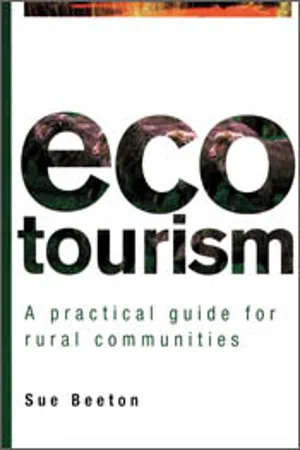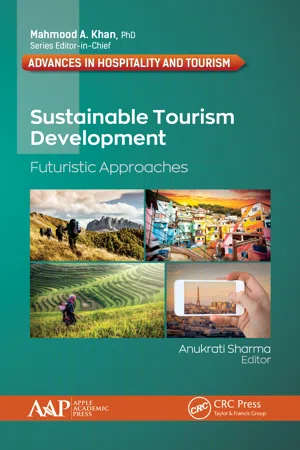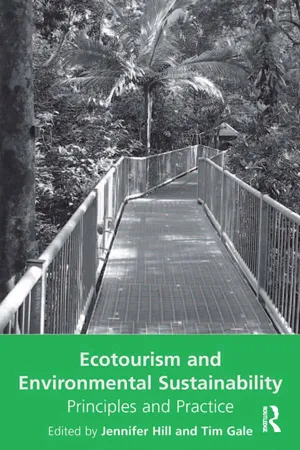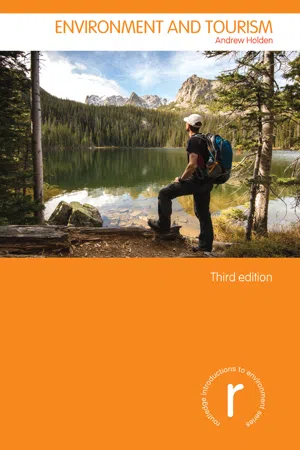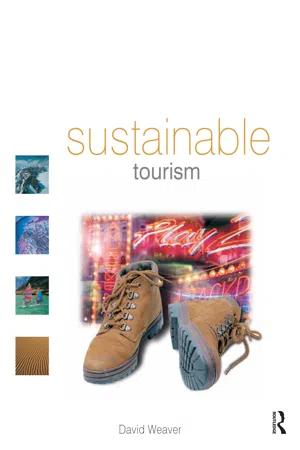Ecotourism
Ecotourism involves responsible travel to natural areas that conserves the environment and sustains the well-being of local people. It focuses on promoting conservation, supporting local communities, and educating visitors about the importance of preserving natural habitats. Ecotourism aims to minimize the negative impacts of tourism while providing meaningful experiences for travelers.
7 Key excerpts on "Ecotourism"
- eBook - ePub
- David A. Fennell(Author)
- 2020(Publication Date)
- Routledge(Publisher)
...To these authors, Ecotourism is: travel to relatively undisturbed natural areas for study, enjoyment, or volunteer assistance. It is travel that concerns itself with the flora, fauna, geology, and ecosystems of an area, as well as the people (caretakers) who live nearby, their needs, their culture, and their relationship to the land. it [ sic ] views natural areas both as ‘home to all of us’ in a global sense (‘eco’ meaning home) but ‘home to nearby residents’ specifically. It is envisioned as a tool for both conservation and sustainable development – especially in areas where local people are asked to forgo the consumptive use of resources for others. Focus on Volunteerism 1.0: GoEco GoEco is a leading eco-tourism company with a varied selection of affordable, ethical volunteer projects abroad. Our team is made up of experienced and passionate specialists who are eager to give you the voluntourism vacation of a lifetime! We act as a gateway to over 150 extraordinary community, wildlife and environmental initiatives all over the world thanks to our great partnerships. Our providers are well diversified, ranging from local community groups to renowned global organizations...
- Linda L. Lowry(Author)
- 2016(Publication Date)
- SAGE Publications, Inc(Publisher)
...Another difficulty is the overlapping nature of many of the so-called alternative forms of tourism activities. Ecotourism incorporates a wide variety of tourist activities, including bicycle tours, farm visits, jungle trekking, birdwatching, flower viewing, stargazing, visits to aboriginal groups, and nature photography. It often overlaps with other tourism types that partly coevolved in the 1980s like nature-based, wildlife, adventure, but also the so-called 3s (sun, sea, sand) tourism that is equated to mass tourism. Ecotourism is a subset of sustainable tourism and nature-based tourism. One of the main differences with other nature-based tourism such as adventure tourism or 3s tourism is the explicit inclusion of a learning component in Ecotourism. Even so, some adventure tourism or 3s tourism that happens in wilderness areas or marine environments clearly qualifies as a form of Ecotourism (e.g., scuba diving, snorkeling). History, Definition, and Approaches to the Term Ecotourism In general, Ecotourism can be defined as a form of noninvasive nature-based tourism that is managed to minimize its impacts, is educational, and contributes to conservation. It therefore minimizes its short- and long-term negative impacts and optimizes the short- and long-term positive benefits for nature, residents, tourists, businesses, and other stakeholders (e.g., environmental organizations) without overwhelming or destroying traditional local business practices and ecosystems. Additionally, it raises the understanding of an area’s natural and cultural systems as well as its global significance among all stakeholders. Typical Ecotourism destinations have a unique environment, a “special” flora and fauna. Such destinations include New Zealand, Australia, Costa Rica, Belize, Norway, and the Antarctic...
- eBook - ePub
Ecotourism
A Practical Guide for Rural Communities
- S Beeton(Author)
- 1998(Publication Date)
- Landlinks Press(Publisher)
...Their contact details are in Appendix Three. A relatively simple definition of Ecotourism that covers all the aspects outlined above has been adopted by the Ecotourism Association of Australia: “Ecotourism is ecologically sustainable tourism that fosters environmental and cultural understanding, appreciation and conservation.” Many academic papers look at other definitions and complexities. If you are interested in more information on the search for a definition of Ecotourism, some papers are listed in the References. While researching the tourism industry, you will come across references to other types of tourism, such as rural tourism, nature-based tourism, farm tourism, adventure tourism, industrial tourism, indigenous tourism, cultural tourism and so on. It can be confusing working out where Ecotourism fits in to the picture, but basically it is part of the broader rural or nature-based tourism industry. Also included in the rural and nature-based area would be farm tourism and adventure tourism (and possibly indigenous tourism), elements of which can be incorporated into Ecotourism. The main difference between Ecotourism and other types of tourism that are based in the natural environment is the educational aspect and its associated ethical stand of supporting and encouraging ongoing conservation and direct benefits to the local community. So, if you are thinking about starting any other type of tourism enterprise (such as adventure or farmstay) this book will still be useful as many of the areas covered here will be relevant and transferable to your enterprise. The concept of ecological sustainability is not just for Ecotourism — all tourism must be sustainable, both ecologically, socially and economically. How Big is Ecotourism? As part of the overall tourism industry, Ecotourism is regarded as a niche enterprise that caters for particular interests of certain tourists...
- eBook - ePub
Sustainable Tourism Development
Futuristic Approaches
- Anukrati Sharma, Anukrati Sharma(Authors)
- 2019(Publication Date)
- Apple Academic Press(Publisher)
...Overconsumption and deforestation activities in many regions slowly devastated the growth of greeneries and a massive conservation approach is a dire need to safeguard the ecology and environment to protect the mother earth for the safe consumption and healthy life of our future generations. Many nations use the term Ecotourism to conserve the natural resources by exploiting tourism in such places and at the same time promotes sustainability for a futuristic approach which envisages the importance of tourism for the development of the ecosystem and thereby generating potential income for safeguarding the natural areas. Tourism activities are interlinked with sustainability in almost all kinds and scales of tourism and environment (Clarke, 1997). Most of the school students are encouraged for Ecotourism as part of the conservation activities as well to tune their sensitivity for the conservation of nature and environment through exclusive strategies of Ecotourism. Such activities not only help to understand the importance of nature and wildlife and explores their knowledge to induce several environmental conservative practices to combat the climate change, global warming, deforestation, extinction of rare species of flora and fauna, wildlife conservation, river pollution, and so many environmentally connected important problems. Often it is very late the governments’ initiatives towards conservation of natural areas through Ecotourism as most of the tribes in the hilly and mountain forests able to conserve the important species through their traditional activities and sense of knowledge. 10.2 Ecotourism Ecotourism is the conceptual phenomenon practiced after the 1980s to promote sustainable tourism related practices in order to conserve the nature and elicit the problems on environmental concerns...
- eBook - ePub
Ecotourism and Environmental Sustainability
Principles and Practice
- Tim Gale, Jennifer Hill(Authors)
- 2016(Publication Date)
- Routledge(Publisher)
...In this way, Ecotourism (as a subset of alternative tourism) is being promoted by governments and the tourism industry as a sustainable alternative to mass tourism. However, critics have suggested that Ecotourism can be damaging to the natural environment, not least with respect to the environmental cost of air travel to popular destinations and the potential for unwittingly disturbing soils and ecosystems through accommodation and activities on site (Wheeller 1991, 1993, Hjalager 1996, Conservation International 1999, Wearing and Neil 1999, Kruger 2005). Doubts have also been raised about the ‘true’ motivations of ecotourists, which appear to have as much to do with sustaining the ego as the environment (Wheeller 1993), and the sense in which Ecotourism encourages increased use of natural areas and greater penetration into sensitive environments, thereby putting the very future of indigenous tourism industries at risk (Mihalic 2000). There is a tendency to overstate its significance, too, when in fact it constitutes only a small proportion of global tourism (estimated at between 2 per cent and 4 per cent; WTO 2002, cited in Cater 2004). Before we explain the aim, philosophy and structure of this book, it is perhaps useful to provide a brief introduction to definitions of Ecotourism; ecotourist types and motivations; and Ecotourism’s (environmental) sustainability credentials. With regards to the first consideration, Fennell’s (2001) content analysis of Ecotourism definitions identifies no less than 85 of these in the literature available at that time which, for a term that only entered academic discourse in the late 1980s, is quite remarkable (if not a little counter-productive)...
- eBook - ePub
- Andrew Holden(Author)
- 2016(Publication Date)
- Routledge(Publisher)
...If the natural, economic and cultural dimensions of the environment are considered in an integrated fashion, and tourism is developed according to the characteristics displayed in Box 6.7, then alternative tourism can be viewed as being synonymous with the concept of sustainable tourism development. A type of tourism closely associated with the characteristics of alternative tourism is ‘Ecotourism’. Its origins are debatable; according to Shackley (1996) it is a term invented by conservationists in the 1970s, whilst for Fennell (1999, 2015) the term can be traced back as far as 1965 to the work of Hetzer who used it to describe the interaction between tourists and the environments. However, the coining of Ecotourism is generally credited to Hector Ceballos-Lascurain in the early 1980s, the then president of the NGO ‘Pronatura’. It was during this decade that the term gained popularity as an increasing demand for new types of tourism destinations coincided with a growing public interest in nature. Also influential in this trend was the production of nature film documentaries that enhanced popular understanding of ecological systems, helping to shape a nascent Ecotourism industry as small enterprises in nations like Costa Rica and Nicaragua responded to the needs for accommodation from scientists and documentary makers (Wood, 2013). Similar to sustainable tourism there exists a lack of consensus about the meaning of Ecotourism (Goodwin, 1996 ; Fennell and Dowling, 2003). There are various interpretations of what it represents; often being defined according to the particular priorities and interests of stakeholders. It is a term that is readily employed by the tourism industry, international agencies, national governments, environmental non-governmental organisations, NGOs and tourists...
- eBook - ePub
- David Weaver(Author)
- 2007(Publication Date)
- Routledge(Publisher)
...The third criterion, environmental and sociocultural sustainability, is implicit in most of the definitions that have been subsequently put forward. Epler Wood, for example, defines Ecotourism as ‘purposeful travel to natural areas to understand the cultural and natural history of the environment, taking care not to alter the integrity of the ecosystem while producing economic opportunities that make the conservation of natural resources financially beneficial to local citizens’ (1991, p. 200). Fennell regards Ecotourism as ‘a sustainable form of natural resource-based tourism that focuses primarily on experiencing and learning about nature and which is ethically managed to be low-impact, non-consumptive and locally oriented’ (1999, p. 43). Each of these three criteria will now be considered in more detail. 11.2.1 Nature-based attractions The nature-based or ecological attractions that are the focus of Ecotourism can range from an emphasis on an entire ecosystem such as a rainforest or coral reef to selected components of the ecosystem. In the latter scenario, which may be described as an elemental approach, Ecotourism destinations focus on non-captive charismatic megafauna such as giant pandas (Sichuan province, China), quetzals (Central America) or mountain gorillas (Rwanda, Uganda and Congo DR) that are especially attractive to ecotourists. More rarely, charismatic megaflora such as redwood trees (California) or the giant Rafflesia flower (Indonesia and Malaysia) are featured. The former scenario, in contrast, can be described as a holistic approach in which these megafauna and megaflora are contextualized within their ecosystem, but are given no more weight than any other interdependent element of that ecosystem. Role of cultural attractions Many Ecotourism definitions, including that of Ceballos-Lascuráin (see above), recognize the role of associated cultural influences as secondary Ecotourism attractions...


